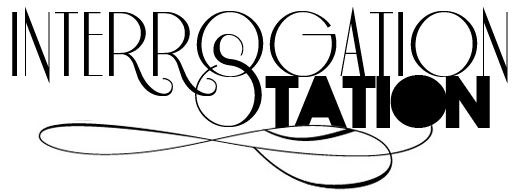
Interrogation Station is here to answer questions from YOU. To give it a go, just submit a question through my Formspring page. You can ask anything you like, it doesn’t have to be about style or art. All I request is that you check out my FAQ and previously asked questions beforehand. I can’t guarantee that I’ll get to every single question, but I will certainly try. You can see the first installment of I.S. here.
So, as it turns out you still have a lot of question. In the interest of keeping my answers interesting and more than one sentence long, I’m going to divide these into many small installments. There are over one hundred [srsly] questions in my inbox and attempting to answer too many at once would result in a whole lot of incoherent mishmash.
How did you learn to draw? How old were you?
I’ve always drawn and that’s the troof. Ever since my little fingers, sticky with black currant jam and rocket fuel, found their way to a my grandfather’s box of fancy European markers. Ever since my mother introduced me to the pre-Raphaelites and Dali and all that Moscow’s museums have to offer. As far back as I can remember, I’ve scribbled and doodled.
As far as the “how” goes, I suppose the timeline between the ages of two and ten went like this:
- Draw, draw draw.
- Be filled with hate at drawings not looking the way I want them to.
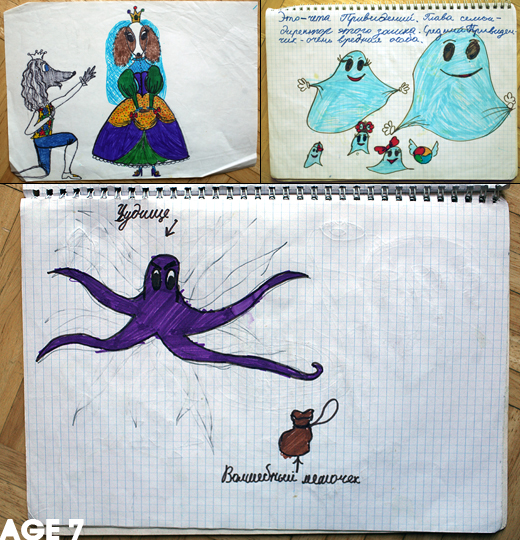
Tentacle love set in early on
- Receive book about basic anatomy in cartooning.
- Draw, draw, draw, draw.
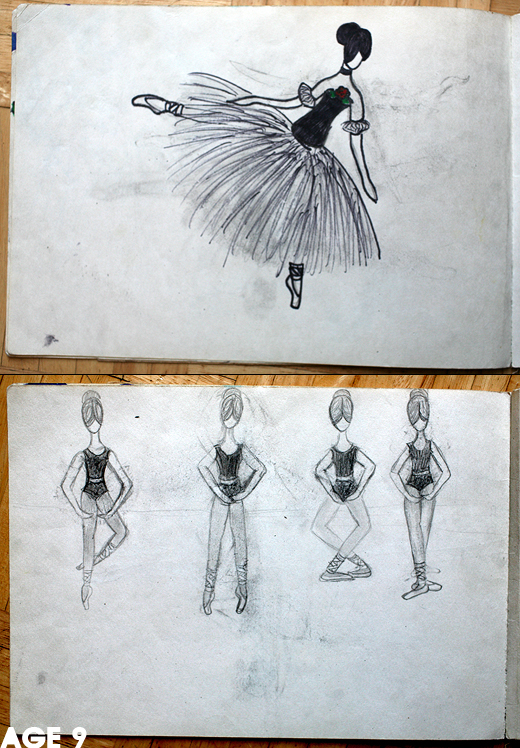
- Get better. Slowly. Very, very slowly.
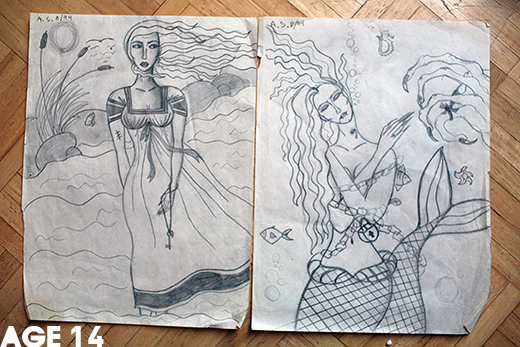
Vampire mermaid! In chains! Haunted by demon-hand!
I’m 18 years old. When I see all the incredible things you’ve accomplished I feel overwhelmed. What were your art skills like when you were 18? I’ve never had a chance to do creative things, but now that I do I just don’t know if it’s too late.
At 18 I was going to the LA County High School for the Arts. I had illustration classes, which I hated deeply but did alright in. A few examples from that time:
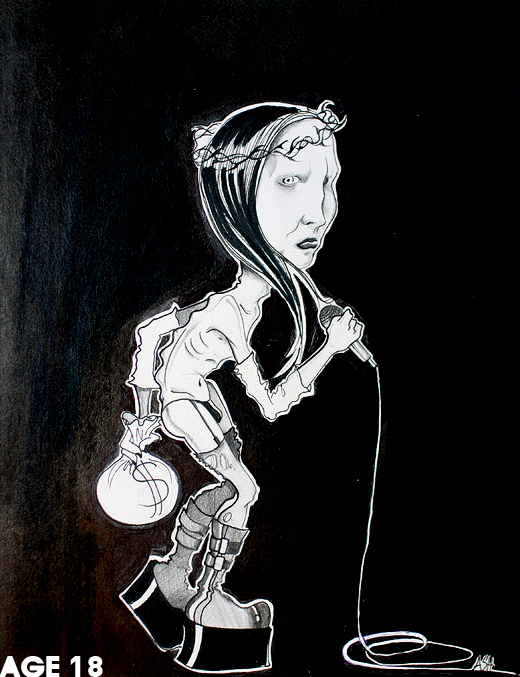
Everyone’s favorite moneygrub
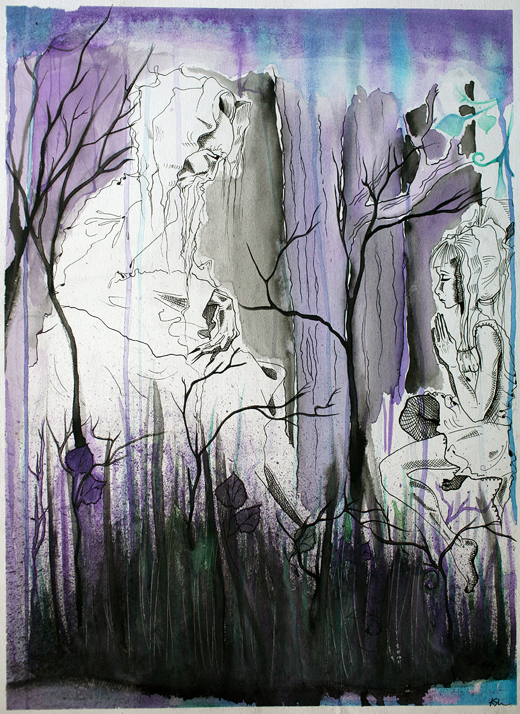
Illustration for one of the final scenes of Oscar Wilde’s The Canterville Ghost
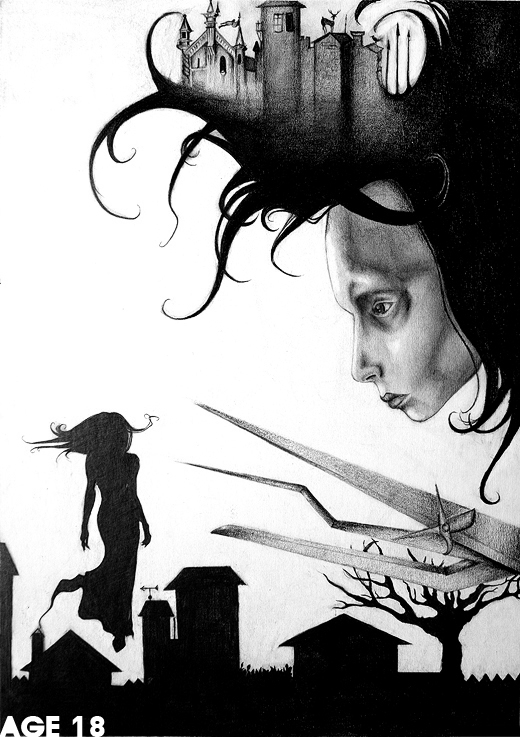
Poster concept for Edward Scissorhands
I believe that you already know what I’m going to say. It’s never too late! I’m 29 and you’re ONLY 18. Consider this: some people don’t decide what their Ultimate Destiny is until they’re well into the silver years, so really, you’re in luck.
If you think you want to make art, it might take a while to find your favorite medium, your style, whether you actually want to try and make a living at it, etc. My advice? Don’t burden yourself with all that anytime soon. Go to museums and art openings, look at art books and comics, soak up your favorite stuff and feed your budding art-brain. Spend some time at libraries and book stores if you don’t feel like shelling out dough just yet. The most important thing to remember is this: you cannot output without input. Get an anatomy book, look up a few tutorials online if need be, and once your brain is heavy with knowledge and power, get to making, constantly, as much as possible.
It is never, ever too late to learn and try new stuff! I didn’t even think about painting until I was 17 or 18.
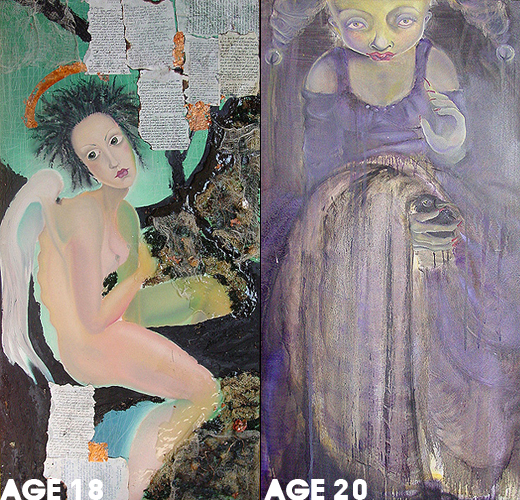
Did you go to college? If so, what was your major? How important do you think a college major is to a career? I ask these things because I admire you. :D
Thank you, kind stranger! I did, indeed go to college and I majored in fine art with focus on painting. I dropped out after exactly one year. Let me preface the rest by saying that I can only speak with some certainty about careers in art. If you want to be an astrophysicist, or a doctor, or travel down any left-brain career path, the answer is yes. You need it, as a launch pad at the very least.
If you want to be a fine artist, the story changes drastically. College is good for building a portfolio, defining some of the ins and outs of your desired career path, meeting like-minded individuals and igniting a fire of competition under one’s ass, which, in turn lights a fire of creativity. All these things are important for a career. However, if you’re motivated enough, you can build a portfolio on your own, you can meet like-minded people at cultural functions, and you can feel competitive to hundreds of established peeps just by going online and researching whatever field you’re going into.
On the flipside, if you want to make films, be an animator, a photographer, etc., college is indispensable when it comes to resources – equipment, editing stations – all those things you might not have money or space for right now, but that you need to work with. The important aspect to understand in all of this is the kind of person you are, and whether you, right now, have the motivation and the resources and, most importantly, the proverbial balls to establish yourself as whatever it is you want to be on your own.
Another dull, but hideously important factor is money. If you live in the States and your family is anything less than loaded, school is really very expensive. You must think ahead, apply for as many scholarships as possible, and enlist your friends’ and relatives’ help if necessary. This is a massive pain in the ass, but check-a dis: I went to a 50k/year school and only owed maybe 3k for my one year there. That’s because my mom and I busted our determined butts applying for every grant and scholarship under the sun.
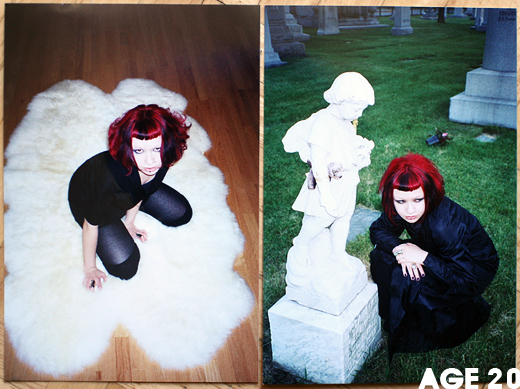
My tragic youth in Chicago, while at SAIC
I didn’t stay in college because mine only offered studio classes with almost no instruction when all I wanted was structure and for someone to actually teach me. At the time of my attendance, the painting department relied very heavily on windbaggery [the ability to convince people that your work is important] instead of skill, which, with me having already gone to an arts high school, was the opposite of what I wanted. However! I had access to one of the best museums in the country on a daly basis and got to do some incredibly fun stuff once I gave up on my actual department. I tried my hand at video and performance art, and I got to live in Chicago, which I love to this day.
Ultimately, there isn’t a magical definitive answer. Whether college will work for you depends entirely on you. It’s a once-in-a-lifetime experience, and if you’re able to give it a go, I say do it. Understand yourself, your work ethic, and the type of school you need, then research and find what works for you. But don’t be ever afraid to leave if it isn’t right.

Thank you for this post!! I’m 21 and trying to pick up drawing again; it’s really discouraging sometimes to feel like you’re too old for it. I drew from age six or seven to fifteen or sixteen on a regular basis, but there just wasn’t a whole lot of time/encouragement for it at my high school, unfortunately. It’s nice to hear someone with so much talent say that it’s never too late! :)
your insights are soothing my battered ego.
Thanks for posting this!
I actually completed a degree and I often think it was a waste. I think you’re right. While getting that structured ‘education’, the experience is really what’s important. If you try and fail over and over again then maybe a school is right for you. But if you’re enjoying what you’re doing, finding success, going at your own pace, then you might just be ALL-RITE!
Zoetica wisdom is always appreciated…considering I posted a few career related questions :X!
Thank you for the advice, I’m in the scholarship/grant process now. This is definitely going to take some time…
~M
This is my favorite BioRequiem post ever. :)
I’ve never seen these before. This makes me want to dig up my own paintings and drawings from that period and post them. Actually, I’ve been seriously thinking about starting to draw and paint again.
Wonderfull insight into the life of an artist! I studied art from an early age once my parents recognized a natural ability, this stunted my growth upon reflection! I had a wonderful H.S. art teacher who just said go for it & I won the H.S. end of year art award as a froshgirl, to the angst of some seniors. I have won other awards through the years before & after that triumph & unfortuatelly became jaded by the need to earn a living, I have finally started to let go again and just do it.
Hopefully others will heed your advice & realize that only they know who they truely are.
Cyn
Purple Octopus!
This is such a sweet post, I could cry. Damn pms.
I went to Bennington College for that perfect juxtaposition between structure and choose-your-own-adventure. Super-expensive when I went (can’t imagine what it is now!), but the scholarships and grants left me with around $15k of debt by the time I graduated (after 3.5 years — another perk was not paying by the credit hour and being able to pack in 24 credits in one semester…). The experience was just what I was looking for — huge choice of amazing classes, no required courses (though I think they have a seminar required now…), and a faculty that seemed hand-picked for their teaching styles and talents.
Thanks for this Zoe!! it means a lot! im currently in college for art and design, and finding it horrifically difficult, i dont follow instruction well, im getting zero support from my tutors and my motivation is currently non-existent. However when out of college i do just fine with my work, i somehow feel i should stay in college because that is the ONLY way to succeed but youve approved what i always hoped.
xox
Wow.wise words.thank you so much for this zoe.we really appreciate such sound and insightful advice :)
You are very wise. I wish that I had had this advice when I went to college. I let what the profs said be the end all, be all of defining my talent, even though my voice didn’t fit a prescribed mold.
I hope that you help many students by this blog entry.
These are some great answers! At twenty-six, sometimes I get all anger with myself and my focus in my life, so, you know, the occasional headbutt on how it is okay to take your time is a pretty good thing to hear (not like I’m doing art, but, you know, writing is similar and such!)
….All Anger? Maybe I should quit writing while I’m ahead – hahaha!
so glad you posted this, zoe! i’ve had it in my head to write a zine touching a bit on this topic, and you really nailed it! i will most likely link to this entry when i’m done :)
Such a great post. Everyone follows their own path to do what they love to do. Its just very rare that people share how they get there, especially in such vividness. And you did more than alright in your illustration classes, ” The Canterville Ghost” is really beautiful. I have to know more about that one?
Thanks Zoetica!
I am in my first year of undergrad studying… natural sciences! I have been struggling for the past year with trying to realize what my passion might be. It’s really encouraging to be reminded that it’s ok to take what may seem like a while in figuring out where one’s heart lies. This sense of feeling lost can be so frustrating, but thanks to beautiful persons such as yourself, us lost goslings can be rescued from the oil slicks of DOOM.
Cheers!
Aw, those age 7 drawings are amazing! I like children drawings.
And look at that ghost family! U used such words as “cheta”, “glava semyi”, “osoba”. It proves that U have had wonderful writing skills since Ur childhood.
man, looking at this PAINS ME that my parents threw away every bit of my childhood artwork. I had it saved, I remember it in my head and they chucked it. total fail. it was nice to see the progression of yours though :)
Thank you, Zoetica. This was very insightful and nice to see how one of my favorite artists got started. I just recently decided to start drawing again after years of not touching a pen, brush or pencil all because art school had took all the fun out of it.
Beep.
Very nice post. Your drawing are wonderful. A good designer always create an innovative design like you. ..thanks.
Say, I’m a visual artist. I’m seventeen. And I go to an arts high school. MAYBE I AM ON THE PATH TO AWESOME, SEEING AS YOU WERE UNDER SIMILAR CIRCUMSTANCES, HMM?
Anyhow, I was just dropping by to tell you, my favorite space girl, that there exists a blog called “Fuck Yeah Space Girls” at fuckyeahspacegirls.tumblr.com
and it reminds me of you – thought that you might appreciate it.
That is all.
Take care, Cosmonomad!
Thanks for answering my question, Zo! In a month or so I’m going to have the time and resources I need to be able to do a few hours of drawing a day! It’s pretty much the only skill I’m interested in having, so it’s really exciting to finally give it a proper go… Especially with some great advice from you. I hope one day I can travel to America and go to a Dr Sketchies with you! I love the photos you take there each time. How fun it must be to be you!
<3 – V
Did you take any art classes when you were living in Russia? the reason I ask is that when I was 12, there was this girl, recently immigrated from Russia, who drew women in very similar style to your drawings. I also saw drawings by a Russian supermodel which have a very similar style. Not that it’s bad or anything but I’m just wondering if that’s the way they taught in Russia(or was it Soviet Union back then)-I grew up in a collectivistic culture when I was little and during mandatory art classes, the teachers showed us “how to draw” and all of us drew in the exact same manner. (thank god I met better art teachers since)
Your paintings/drawings seemed to have changed tremendously since then and I love them.
I forgot to mention that I was referring to your particular drawings at age 14 because obviously your style has become very different.
I went to an ivy league for three years as a fine art major b4 i decided it wasn’t for me. thanks for this. it makes me realize that i’m not the only one who takes the unconventional path. :)